Mozambique launches 8-year plan to combat crimes
The absence of state presence could worsen radicalisation of conflict in northern Mozambique – NGO
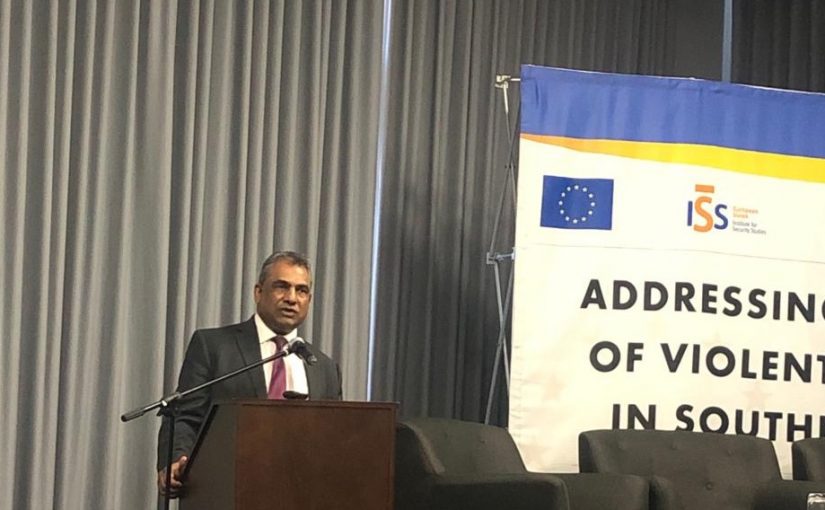
Photo: Twitter / @ACCORD_online
The director of the African Centre for the Constructive Resolution of Disputes (ACCORD) told Lusa on Wednesday that the absence of state presence in northern Mozambique could lead to further radicalisation.
“The possibility of a radicalisation of the population in Cabo Delgado and the increase of extremist violence exists, and the [Mozambican] government should give this priority,” founder and executive director of ACCORD Vasu Gounden said.
Speaking on the sidelines of a seminar on the threat of violent extremism in Cabo Delgado, northern Mozambique, held by the European Union together with international and regional partners in Pretoria, Vasu Gounden said that natural gas is “a recipe for benefits for the country, but it’s also a recipe for disaster ” if not properly managed.
Focusing now on the specific dynamics which have emerged in Northern Mozambique in relation to the emergence of Violent Extremism and the responses which have been adopted thus far. @EU_ISS @EU_Commission #ForeignPolicyInstruments @Hardeman @eu_eeas pic.twitter.com/Flgn92glUz
— ACCORD (@ACCORD_online) November 27, 2019
“Natural gas must be managed in a way that benefits the entire population of Mozambique, and in particular that of Cabo Delgado, so that the population has access to basic services and is not vulnerable to radicalisation,” he said.
Asked by Lusa about the genesis of the current violence in Mozambique’s northern province, Vasu Gounden said it was due to decades of armed conflict between the Mozambican National Resistance (Renamo) opposition party, and the Mozambican Liberation Front (Frelimo), in power since 1975.
“Because of this conflict, and given the challenges Renamo had and the challenges of the peace process, that part of the country [Cabo Delgado] does not have effective governance by either party,” he said.
“The Government of Mozambique is expected to have more effective control over its territory, and if the vacuum continues, it will certainly be occupied by someone,” Gounden said.
“Any situation where there has been armed conflict, if the structures that were created in the past, whether revolutionary or liberating in context, are not dismantled or reinstated, will remain a problem,” the ACCORD director told Lusa.
Frelimo began its armed liberation struggle against the then Portuguese colonial regime in Cabo Delgado province about 60 years ago.
The final roundtable for today’s seminar is addressing how the emerging threat of Violent Extremism in Southern Africa can be mitigated. @EU_ISS @EU_Commission #ForeignPolicyInstruments @HardemanHildeML @eu_eeas pic.twitter.com/F3LTb2dxjv
— ACCORD (@ACCORD_online) November 27, 2019
The seminar, entitled “Addressing the threat of Violent Extremism in Southern Africa”, was organised by the European Union (EU) in coordination with the South African Institute for Security Studies (ISS), and yesterday brought together in the South African capital researchers, academics, diplomats and experts in international terrorism and regional security to analyse the emerging phenomenon of radical groups in Mozambique and southern Africa.
In some parts of northern and central Mozambique, specifically Cabo Delgado, Sofala and Manica, armed groups have been carrying out armed attacks against civilian vehicles, authorities and villages.
Attacks by armed groups in Cabo Delgado province erupted two years ago, supposedly in radicalised Muslim communities.
At least 300 people have died, according to official and witness data, and 60,000 have been affected or forced to leave their land and places of residence, according to the latest version of the UN global humanitarian aid plan.
Since June, the Islamic State jihadist group has claimed some of the attacks in Cabo Delgado, but officials and analysts contacted by Lusa have said it is unlikely that there is genuine involvement by the terrorist group that goes beyond simple contact with elements on the ground.
Happy to be in Pretoria with @gioFALEG for the seminar addressing the threat of violent extremism in Southern Africa that @EU_ISS organizes together with our partners from @ACCORD_online, @EU2019FI, @EU_Commission, @eu_eeashttps://t.co/BMswZOIzX9
— Katariina Mustasilta (@KMustasilta) November 27, 2019
Vasu Gounden
Vasu Gounden is the Executive Director of the African Centre for the Constructive Resolution of Disputes (ACCORD) which he founded in 1992. He is a lawyer, mediator, and an experienced conflict management practitioner and trainer.
Vasu studied at the University of Durban-Westville (UDW) where he obtained his LL.B. He was President of the Students Representative Council (SRC) at UDW during the State of Emergency in 1985/6. He practiced as a human rights and trade union lawyer. He holds a Masters degree in law (LLM) from Georgetown University in Washington DC, which he obtained under a Fulbright Scholarship in 1990 specialising in international negotiations, mediation and arbitration. In 1990 he served as a Senior Fellow at the National Institute for Dispute Resolution in Washington D.C. In 2000 Gounden completed the Senior Executive Programme of the Harvard and Wits Business Schools. In 2016 the University of KwaZulu-Natal, South Africa, conferred an honorary Doctorate of Social Sciences on Gounden for his work in the field of peace and security over the last twenty five years.
He has served on several Government commissions and independent bodies. In 1992 he was appointed as an expert advisor to the South African National Peace Secretariat. In 1994, during the first democratic election in South Africa, he was appointed as Head of Information Analysis by the Independent Electoral Commission (IEC) and to manage the relations among the political parties contesting the election in the Province of KwaZulu-Natal. In 1999 during the second democratic elections he was appointed by the IEC as a mediator for the KwaZulu-Natal Province. In 1997 he was appointed to the Future Challenges Commission to assess South Africa’s technological needs in the future. He was one of two persons nominated by the South African Government to serve on the “Good Offices of the Secretary General of the Commonwealth” to mediate in international conflicts. In August 1998, Gounden was appointed by the South African Minister of Safety and Security to serve on a five-member Independent Committee to investigate racism in the South African Police Services. He was also appointed in 2011 by the UNDP to serve on a three person Independent Advisory Panel to evaluate UNDP’s assistance to conflict affected countries.
In 2012 Gounden was appointed by the South African Minister of International Relations and Cooperation to serve on a Task Team to review the National Development Plan towards 2030 for South Africa. In 2013 Gounden was appointed onto the Tana High Level Forum on Security in Africa’s Technical Committee.
Gounden has been involved in preparing conflicting parties across Africa for negotiations, including rebel groups in Burundi and the Democratic Republic of the Congo (DRC). He has provided mediation support to the facilitators of the Burundi Peace Process, which included former President Nelson Mandela, President Jacob Zuma and Minister Charles Ngcakula, and has served as an advisor on mediation strategy to former President Ketumile Masire on the InterCongolese Dialogue Peace Process. Mr. Gounden was appointed as mediation adviser to the Deputy Minister of International Relations of South Africa who facilitated the recent Madagascar mediation.
Gounden was also involved in Palestine from 2005-2010 in an initiative led by ACCORD and the African National Congress (ANC), and funded by Sweden to share South Africa’s experience. The several initiatives, over a five year period, involved meetings with all the different Palestinian factions including Fatah and Hamas. The meetings were aimed at encouraging the various factions to seek consensus and present a united front in negotiations with the Israelis. Gounden has also been involved in a similar initiative over several years in Sri Lanka.
Apart from his professional commitments, Gounden also serves on several Boards. In 2001 Gounden was appointed by the Minister of Water Affairs and Forestry to serve on the Board of Umgeni Water. In 2005 Gounden was re-appointed to serve a second term in the capacity of Vice Chairperson of the Board and in 2009 was re-appointed for a third term. He also serves on the Boards of the Gandhi Development Trust; the Old Mutual Science Education Foundation (serving as Chair of the Board between 2009-2011); the International Advisory Board of the Finnish based Crisis Management Initiative; and the Council of the Dutch based InterChurch Organisation for Development Cooperation. He is also a member of the editorial board of the Peace and Conflict Studies Journal and serves on the advisory board for the Insight on Africa Journal. Past Boards on which Gounden has served includes the governing board of the former University of Durban-Westville, on the Council of the University of KwaZulu-Natal (UKZN), which resulted out of the merger between the University of Natal and the University of Durban-Westville; the International Center for Eyecare Education; the Artists for Human Rights; Alliance Française, Durban Chapter; and as a founding Board member on both the International Eco-Peace Village (Cyprus); the International Forum on Early Warning and Early Response (FEWER); the Hawaii based Centre for Global Nonkilling; and was a member of the International Advisory Board of the International Negotiation.
Mr. Gounden’s achievements led the World Economic Forum to elect him as one of their Global Leaders for Tomorrow (GLT). The GLT network represents the new generation of global decision-makers from business, Government, politics and civil society who have demonstrated responsible leadership vis-í -vis society, environment and socially responsible business.
In 2014 Gounden was appointed by the Premier of the Province of KwaZulu-Natal, South Africa, to serve on a Special Committee focusing on Social Cohesion, and by the South African Minister of Arts and Culture to serve on the Advocates for Nation Building and Social Cohesion Forum. He was also appointed by the Australian based Institute for Economics and Peace to the 2014 Expert Panel for the Global Peace Index and was appointed to serve on the SADC Mediation Experts Reference Group.
In 2015 Gounden was appointed by the Premier of the Province of KwaZulu-Natal, South Africa, to serve on a Special Reference Group on Migration and Community Integration in KwaZulu-Natal. He was also appointed by the Government of South African to serve on the South African Council on International Relations. On 11 April 2016 the Senate and Council of the University of KwaZulu-Natal (UKZN) conferred an honorary Doctorate of Social Sciences on Vasu for his distinctive service and significant contribution to Conflict Resolution and the discipline of Peace and Security globally. The university noted that under his guidance ACCORD is contributing to policy and conflict management capacity in the UN, the African Union, Africa’s Regional Economic Communities and national governments, and has developed into the largest Conflict Resolution organisation in Africa, making significant contributions to peace and security in Africa. (Source. ACCORD)


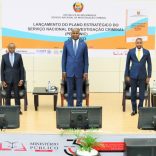
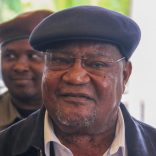
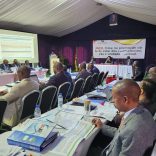
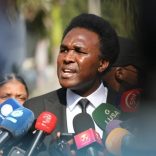
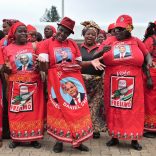
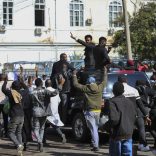




Leave a Reply
Be the First to Comment!
You must be logged in to post a comment.
You must be logged in to post a comment.